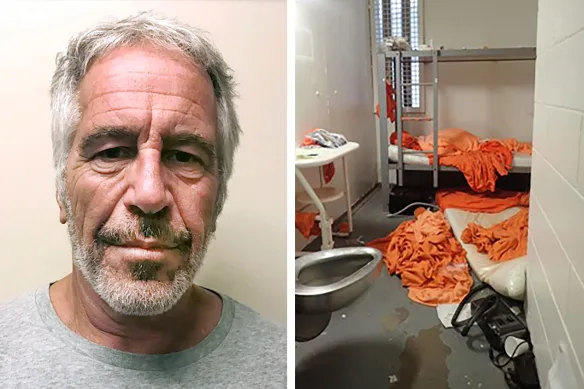
Jeffrey Epstein was left alone in his jail cell with a surplus of bed linens the night he killed himself. Nearly all the surveillance cameras on his unit didn’t record. One worker was on duty for 24 hours straight. And, despite his high profile and a suicide attempt two weeks earlier, he wasn’t checked on regularly as required.
The Justice Department’s watchdog said Tuesday that a “combination of negligence, misconduct and outright job performance failures” by the federal Bureau of Prisons and workers at the New York City jail enabled the wealthy financier to take his own life in August 2019, finding no evidence of foul play.
Inspector General Michael Horowitz blamed numerous factors for Epstein’s death, including the jail’s failure to assign him a cellmate and overworked guards who lied on logs after failing to make regular checks. Had the guards done so, Horowitz said, they would’ve found Epstein had excess linens, which he used in his suicide.
The failures are deeply troubling not only because they allowed Epstein’s suicide but also because they “led to questions about the circumstances surrounding Epstein’s death and effectively deprived Epstein’s numerous victims of the opportunity to seek justice,” Horowitz said in a video statement.
Horowitz’s investigation, the last of several official inquiries into Epstein’s death, echoed previous findings that some members of the jail staff involved in guarding Epstein were overworked. He identified 13 employees with performance failures and recommended possible criminal charges against four workers. Only the two workers assigned to guard Epstein the night he died were charged, avoiding jail time in a plea deal after admitting to falsifying logs.
Horowitz’s report also revealed new details about Epstein’s behavior in the days before his death, including that he signed a new last will and testament while meeting with his lawyers two days before he was found unresponsive in his cell the morning of Aug. 10, 2019. Jail officials did not know about the new will until after Epstein’s death, Horowitz said.
Few of the cameras in the area where Epstein was housed were making recordings of the images they captured due to a mechanical failure July 29. The prison had contracted for a camera system upgrade three years before his death, but it had not been completed, in part due to serious staffing shortages.
Meanwhile, Epstein was alone the night of his death, even though the prison’s psychology department had informed 70 employees that he needed to be with a cellmate after his previous suicide attempt in July. His cellmate was nevertheless transferred Aug. 9, with no action taken to replace him. He was also allowed an unmonitored personal phone call the night before he was found dead, a violation of BOP policy.

